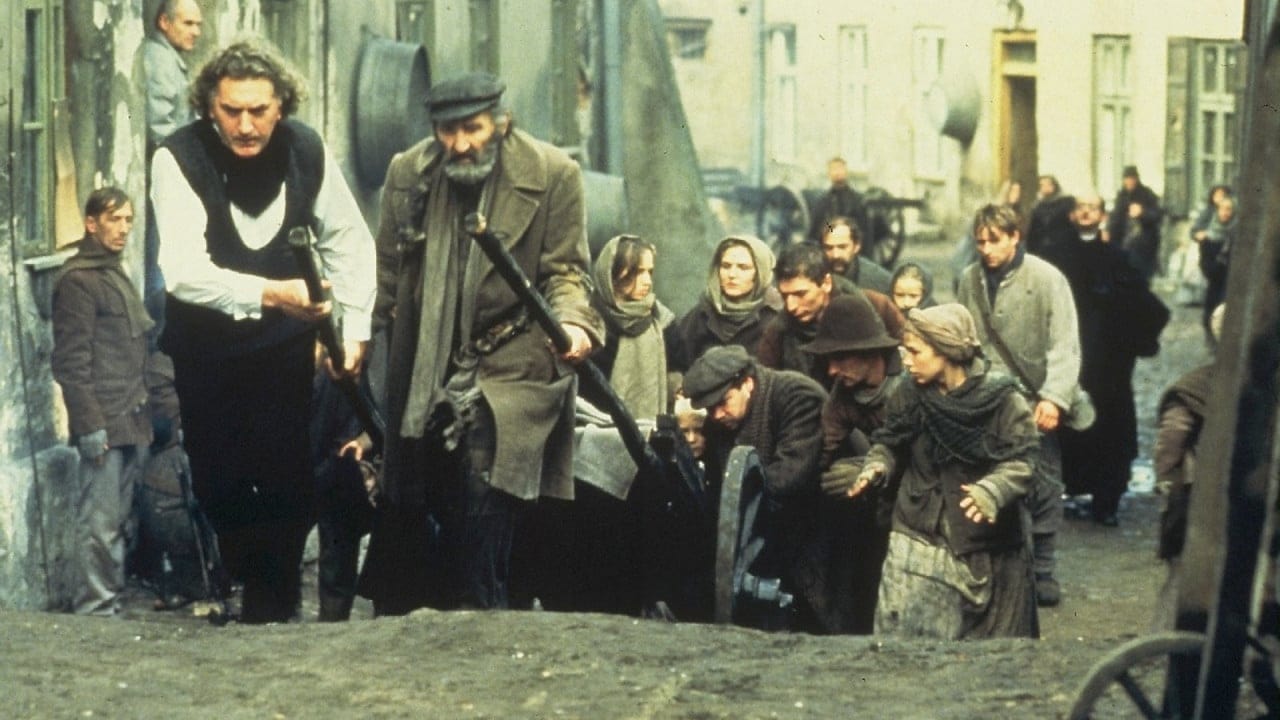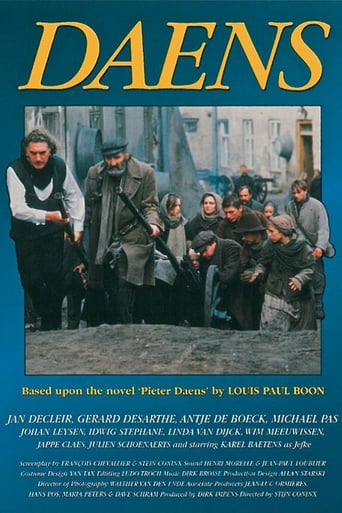GurlyIamBeach
Instant Favorite.
SteinMo
What a freaking movie. So many twists and turns. Absolutely intense from start to finish.
Sienna-Rose Mclaughlin
The movie really just wants to entertain people.
Guillelmina
The film's masterful storytelling did its job. The message was clear. No need to overdo.
Emil Bakkum
Socialism and the social-democracy originate from Europe, where the industrial revolution began. It became the ideology of the workers, who were cruelly exploited and suppressed by the capitalists. The social problem created political controversies. It all started with the textile production, which was concentrated in England and Belgium. In the beginning the new capitalist system was pretty disgusting. Often the situation of the industrial workers worsened in comparison with the preceding feudalism. The film Daens narrates this not very nice episode of our history for the Belgian case. At the time Belgium was still under the influence of the catholic church. The Pope had proclaimed the encyclical letter Rerum Novarum, which stressed the rights of the workers. However, the capitalists were not impressed. And since eventually the church follows the money (for someone has to pay the bills), there was little real improvement for the workers. Daens is a priest, who sides with them. The capitalists don't like this, and exert pressure on the church. Spoiler! Daens is expelled from priesthood, and continues as a politician. Fortunately decency still exists. The film is based on a book by Louis Paul Boon (Opus magnum: De kapellekensbaan). Boon has a surrealistic and dejected style of writing, which focuses on the human shortcomings. This is noticeable in the film plot, so prepare yourself for some degenerate behavior, rapes, children freezing to death or being crushed by weaving-looms etcetera. However Boon never creates a sensation, and mentions these disasters more or less in passing (which makes it so surrealistic). In fact the heroic Daens is a bit atypical, and may be a deviation from Boons book (which I have not read). If you believe that the history of capitalism is a success story, than this film will surprise you. If you like persiflages, this film will please you. If you are interested in history, this film will educate you. What more can I say? By the way, you will find many similar films in my list of reviews. Take for instance "Subterra", or more timely "Norma Rae". There may well be many recent South-American films about the same theme. If so, tell me. Oh, and don't forget to check off the "useful: yes" ballot. I love comments.
max-vernon
I am writing this review during the Papal interregnum following the death of Pope John Paul II. Most appropriate. There is intense speculation about whether the Catholic Church needs a Third World pope to better represent the needs of the impoverished masses who inhabit areas of the world where the faith is still growing. The Church in Europe has been in long-term decline and Catholic priests today face similar choices and dilemmas to those faced by Daens a century ago.The film 'Daens' portrays the struggle of a courageous man to spread the gospel of Christ to impoverished and exploited textile workers in late 19th Century Belgium. His main enemies are the 'Godless' socialists who offer his flock a more earthly paradise and also his own Church hierarchy who stand fast with the capitalist class in opposing all attempts at social reform. Daens follows the dictates of conscience, founds his own Catholic People's Party and becomes a charismatic leader of the Flemish-speaking poor whose interests are largely ignored by the French-speaking Christian Democrats. This official Church-backed Catholic Party is dominated by capitalists who see religion as a means of social control and property-protection.The scene is set for conflicts of conscience, class and language. How should the Church respond to the new evils of capitalism? Daens, of course, is only trying to follow the spirit of the Holy Father's encyclical 'Rerum Novarum' (1891) which endorsed state regulation to curb the worst abuses of industrialism. Complaints from the Belgian hierarchy result in Daens being summoned to Rome to explain himself. He never gets to meet the Pope and is eventually excommunicated for his disobedience to his local hierarchy.Echoes here of 'Liberation theology' and Pope John Paul II publicly rebuking a Sandinista priest in Nicaragua for his political activities. Echoes also of Martin Luther's stand against different abuses 400 years earlier.There is a great deal going on in this film and its subject matter is difficult and obscure. Nevertheless 'Daens' successfully portrays the man and his milieu in an entertaining way. The film held my interest throughout and it spurred me to research the topic further. Its depiction of living and working conditions is exemplary and the industrial accident scene is harrowing. The subplot focusing on a working girl's attraction to both the Church and to a young socialist radical encapsulates the wider struggle being played out on the political stage. The inferior position of Flemish in Belgian society at that time is shown by the mainly Flemish dialogue used between Daens and his flock and the mainly French dialogue used between Daens and his Church and social superiors and within the Belgian parliament. The parliamentary Commission of Enquiry into working conditions is unable to question the Aalst workers properly because of this language barrier.Sexual harassment of women in the workplace which used to be so commonplace is shown by a particularly strong rape scene.The fact that the perpetrator is a factory foreman underlines both 'capitalist lackey' and 'corruption of power' themes.The film gives some insight into the tremendous hostility which developed between the European Left and the Catholic Church from the French Revolution onwards. The Church under the recently sanctified Pius IX (1846-1878) turned its back on everything modern. The Left turned its back on a Christian religion whose main institution resisted all the new ideas thrown up by tremendous social change. These are the big themes against which the Daens drama is acted out.And acted out well it certainly is. Jan Decleir gives a powerful performance as the eponymous hero. The reverence of simple Catholic workers for their Church, their suspicion of socialism but desire for better conditions together provide the springboard for the short-lived Daens success story. This complex social dynamic is beautifully depicted in intimate scenes in which individual relationships are used to explain the wider picture. The film is always in danger of collapsing under the weight of the historical events it depicts. This never quite happens and it is hard to envisage a better screenplay for a film of this length and difficulty of subject. The Daens theme is with us still. Archbishop Romero was killed by right-wing gunmen for supporting the poor. The Catholic archbishop of Recife in Brazil famously said, "When I say, 'Feed the poor' they call me a saint. When I ask, 'Why are they poor?' they call me a Communist."Having consigned Communism to the dustbin of History (at least temporarily?), Pope John Paul II spent his last years railing against capitalist materialism and economic inequality. In my opinion, Catholics will only solve this dilemma when they are able to reconcile Scripture with the Enlightenment and absorb Marxist and other secularist critiques of global capitalism into their faith. Unfortunately their Church over the last two centuries has usually backed the powerful against the weak, the rich against the poor. Daens is an example of thousands of individual Catholics world-wide who have taken simple Christian teachings at their face value to follow their own conscience. Equally, there is no compelling reason for the Left to maintain its historic antipathy towards religion. Christianity and Socialism are natural bedfellows.For a non-Belgian audience with a poor knowledge of history 'Daens' could be a difficult film to enjoy. I hope that this review will help more people to access it and understand the powerful light it throws on much wider religious and political issues. A Daens website in Belgium shows that this man still has his local fans but it would be too much to expect the Church to lift its ban of excommunication, let alone consider him as a candidate for beatification. The Church has recently apologised for the way it treated Galileo, so who knows? That is entirely a matter for the Church but I would urge anyone interested in religion, history and politics to watch this film. I eagerly await its DVD format.
kimvdbrempt
This movie shows how life was in the late 19th century. I come from Aalst and Daens was and still is a highly respected priest who cared for the poor and who wasn't afraid of those rich mother******* and the corrupt, pathetic (it still is) church.Together with his brother he faced and defeated the rich. He helped the poor people and got them the right to vote. In his quest he the pope and all who were against him eventually took away his rights as a priest.
Daens continued to help the poor, and became the voice of the people in the parliament. He was a good man who stood up for the poor.
The movie itself gives a very good look how people worked their asses of for only a few CENTS.
mifunesamurai
Poverty amongst the workers of Belgium during the late 19th Century. Along comes a radical Priest, Adolf Daens, to bring a glimmer of hope and humanity into their souls. A powerful film which could have done with more time in revealing the magnitude of this character.

